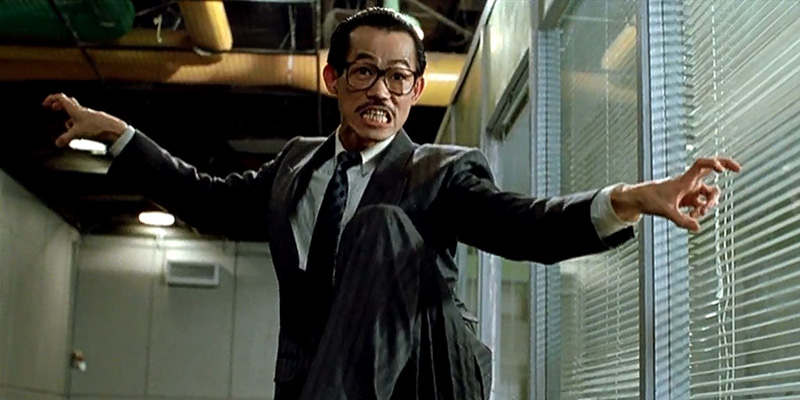Throughout the history of Hong Kong cinema, comedy has always been evident and stylistically unique, especially since the early 70’s when a way of revitalising a stagnant movie scene was needed following the death of Bruce Lee. Lee’s films introduced gritty storylines with an equivalent style of violent, yet beautiful action, providing the Chinese people with a down to earth hero. However, his death in 1973 almost signalled the death of the Jade screen as terrible look-alikes and cheap rip-offs plagued the screens, with comedies eventually providing the antidote.
Ever since the pioneering early works of Yuen Woo Ping, Jackie Chan and Sammo Hung, comedy and kung fu became the perfect foil for each other. Moviegoers were given the opportunity to watch an action film without being constantly and distastefully reminded of Bruce Lee, whilst letting new stars step out of his considerable shadow.
One of the earliest examples of such a successful blend of comedy and fighting came in 1976 with Michael Hui‘s ‘The Private Eyes‘. Sammo Hung had been on hand to add a little spice to the action, while the amusement came from the innovative use of weaponry. For example, sausages were used as nunchaku being defended against by a set of shark’s teeth to the theme tune from ‘Jaws’. This style of filmmaking had not been seen before, and its refreshing look is still popular among fans today.
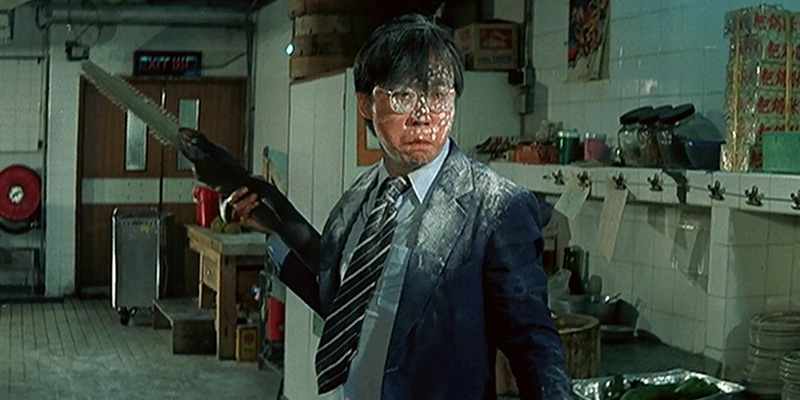
As the 70’s came to a close, two films, and the success of one star in particular, redefined the action-comedy genre ultimately changing the way action cinema has developed ever since. The two films were ‘Snake in the Eagle’s Shadow‘ and ‘Drunken Master‘, with the performer being Jackie Chan. At the time Jackie was quickly running out of chances after a string of cinematic flops, with these two films suddenly transforming him into an overnight star. Consequent efforts from various actors and directors re-used these movies simple formulae to further success, however, even this revolutionary new style of filmmaking quickly became stale and something new was again needed.
This new kind of kung fu comedy came in the form of the Sammo Hung directed ‘Carry on Pickpocket‘ and the first in the Lucky Stars series ‘Winners and Sinners‘. These movies did away with the old fashioned style of martial arts and master/student storylines, instead introducing a shorter, less rigid and fast paced style of fighting within the framework of individual comedic plotlines. The latter also introduced us to the now famous and revered trio of Sammo Hung, Yuen Biao and Jackie Chan quickly becoming the lynchpin of what are today considered to be some of the most universally popular kung fu comedies ever.
‘Carry on Pickpocket’ was one of the first true contemporary action comedies in the sense that it used modern day settings, 80’s fashion and blistering fight sequences. One scene in a nightclub incorporates all these elements as Sammo does a Charlie Chaplin with Bread sticks before beating a group of clubbers while wearing a terrible 80’s Mickey Mouse sweatshirt, all in the space of 10 minutes!
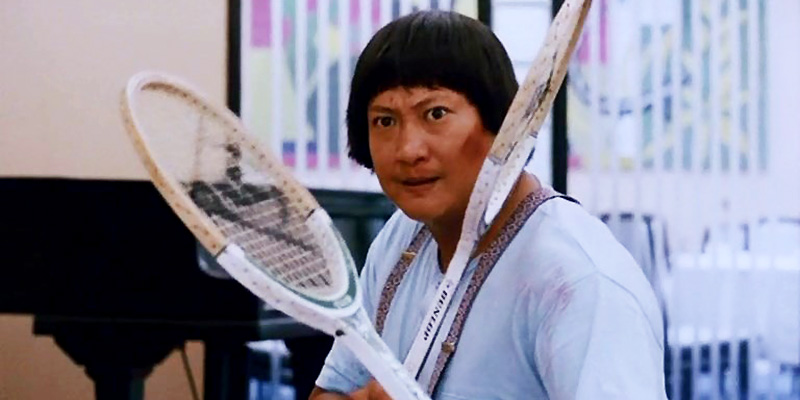
Amongst some stand out fight sequences, ‘Winners and Sinners’ provides an ingeniously entertaining and dangerous vehicle chase sequence involving motorbikes, cars and high-speed roller-skating! One of the film’s sequels ‘Twinkle Twinkle Lucky Stars‘ features a perfect mix of comedy and fisticuffs as Sammo impressively duels a Sai wielding Yasuaki Kurata with a pair of tennis racquets! Nothing at the time could match the wit and ingenuity encapsulated within these films, catering successfully for those in search of both laughs and heart-stopping excitement.
A constant presence in the Lucky Stars series are Eric Tsang, Richard Ng and Stanley Fung combining hilariously to create a Chinese version of ‘The Three Stooges’, often recreating a lot of the short set pieces seen in the trios old black and white American movies. Eric is very often the butt of all the jokes in these films, but off screen is a very different character, being a powerful producer and director. In more recent times he can be seen in roles opposite Jackie Chan and Jet Li in ‘The Accidental Spy‘ and ‘Hitman‘ respectively, providing some amusing light relief.
In the early to mid 80’s, almost every Hong Kong action flick incorporated some elements of comedy, even relatively serious films such as ‘Police Story‘. Unfortunately, some Western versions of this film cut out the comedic sequences meaning that many have missed out on seeing Jackie moonwalk through a cowpat or trying to hold 5 telephone conversations at once getting increasingly confused in the process. It has been generally perceived that westerners would not understand a lot of Chinese humour or welcome it within serious action films, resulting in such scenes being excised from international prints. However, a lot of this comedy is visual, therefore allowing it to work anywhere unhampered by a language barrier.
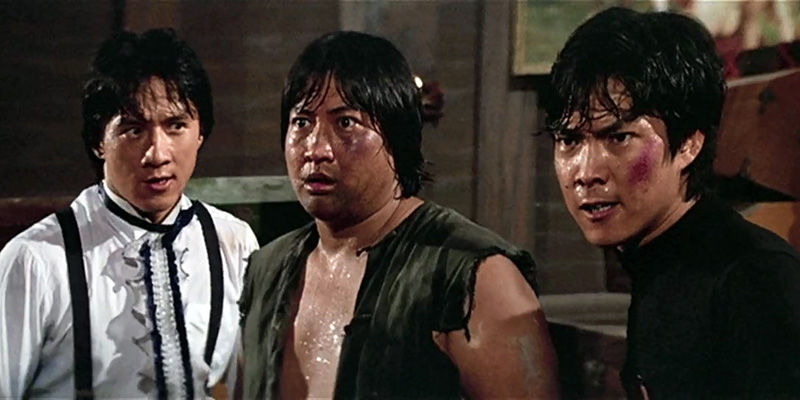
In 1984, the Hung/Biao/Chan trio combined to star in Chan’s directorial masterpiece ‘Project A‘. Not only did the film cement the trio’s box-office draw, and that of the newly versatile kung fu comedy style of movie, but also saw first indications of the heavy influence that early twentieth century silent performers such as Harold Lloyd, Buster Keaton and Charlie Chaplin have had in Jackie’s style of action design. The sequel to ‘Project A’ saw a dramatic reconstruction from a scene in the 1920’s silent comedy ‘Steamboat Bill Junior’ where the side of a building collapses onto Jackie with only a small open window saving him from being squashed! To this day Jackie is still often described as the Buster Keaton of kung fu.
The trio continued to make quality films together until 1987, when, whilst making ‘Dragons Forever‘ tensions boiled over between Jackie and Sammo, coupled with Yuen Biao’s desire to become more independent, resulting in the old school friends going their own separate ways and have not been seen on screen together as a trio since. This split was probably one of the reasons for a slide in the quantity and quality of subsequent action comedies, contributing to the evident lack of such movies in the late 90’s. Recently, all three have expressed a desire to work together again and Hung has since directed Jackie on ‘Mr Nice Guy‘, while Biao helped style the action for Chan’s Hollywood hit ‘Shanghai Noon‘.
An equally successful set of films as the Lucky Stars were the ‘Aces go Places‘ series, and in 1987 Sammo teamed up with old friend and ‘Dirty Tiger, Crazy Frog‘ colleague Karl Maka to create ‘Lucky Stars go Places‘ in order to breath new life into the franchise. Unfortunately, by the end of the 80’s both concepts were running out of steam. Also, as Jackie and Sammo had fallen out, Chan’s absence from further films in the series would have reduced their overseas marketability. Consequently, Sammo went on to make a varied style of films with some such as the fantastic ‘Pedicab Driver‘ and ‘Millionaires’ Express‘ incorporating comedy, whilst others such as the equally good ‘Eastern Condors‘ did not.
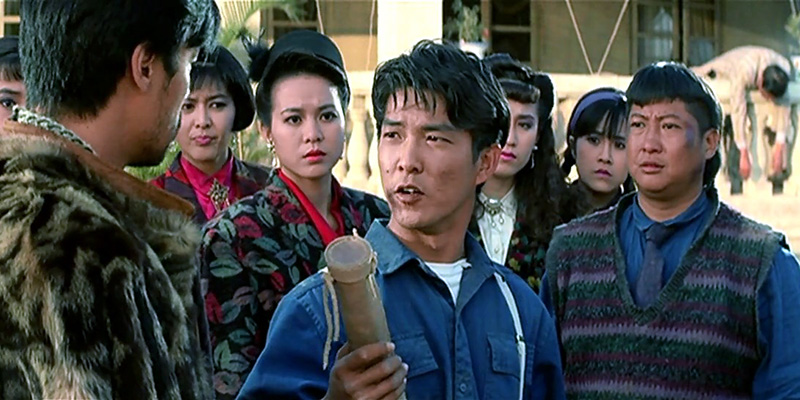
‘Millionaires’ Express’, known as ‘Shanghai Express’ in the West, is one of the last classic examples of the Kung fu comedy genre, and fittingly features everyone who was anyone in Hong Kong cinema at the time, except for Jackie Chan who was absent as a result of the aforementioned break-up. This movie has the best of everything, with superb comedy scenes such as numerous instances of Richard Ng trying to get away from his frumpy wife to be with another woman, resulting in some of the most ingenious excuses ever heard! The action too is superb, with standout moments from Yuen Biao against both Dick Wei and Sammo, while westerners Cynthia Rothrock and Richard Norton get another chance to shine on the Jade screen.
Since the early 90’s, the stylised, new wave genre of kung fu movies, such as the ‘Once Upon a Time in China‘ series, have displayed no need for a high comedy element, and as a result, the kung fu comedy style of filmmaking appears to have been buried. A small handful of quality 90’s actioners have successfully incorporated comedy, such as Jet Li’s impressive ‘Fong Sai Yuk‘. Here, it is not Jet’s character, but that of his mother that generally brings a smile to your face. In the sequel, Sai Yuk’s mother has a steamy, drunken night with Yuen Kwai and afterwards believes herself to be magically pregnant, developing a huge belly by the morning! However, her sudden bloated state was actually a result of trapped wind and not Immaculate Conception!
Since then, the only person to consistently and successfully incorporate large amounts of comedy with action has been Jackie Chan, believing this to be his ticket to the West. In Hong Kong, comedies and action movies have become relatively polarised, and as such, are not able to blend together as smoothly as they once did. This may remain the case until the next phase of action movie develops, as has been the case at the beginning of the last couple of decades. Unfortunately, the next phase appears to be in Hollywood, where choreographers and action directors such as Woo Ping, Yuen Kwai, Dion Lam and Yuen Cheung Yan have been called upon to help in the creation of a new style of Western blockbuster, leaving Hong Kong to develop in an uncertain way.
If we never see another ‘true’ kung fu comedy to rival those of the 80’s, then at least classics such as ‘Project A’, ‘Winners and Sinners’ and ‘Millionaires’ Express’ will be forever available on DVD as they were originally intended to be seen, allowing new and future generations of fans to experience some of the Jade screens finest cinematic moments.

Some of the best ‘Kung fu comedies’:
- The Private Eyes – 1976
- Dirty Tiger, Crazy Frog – 1978
- Drunken Master – 1978
- The Prodigal Son – 1981
- Carry on Pickpocket – 1982
- Aces Go Places III: Our Man In Bond Street – 1983
- Project A – 1984
- Twinkle Twinkle Lucky Stars – 1985
- Dragons Forever – 1987
- Millionaires’ Express – 1987

